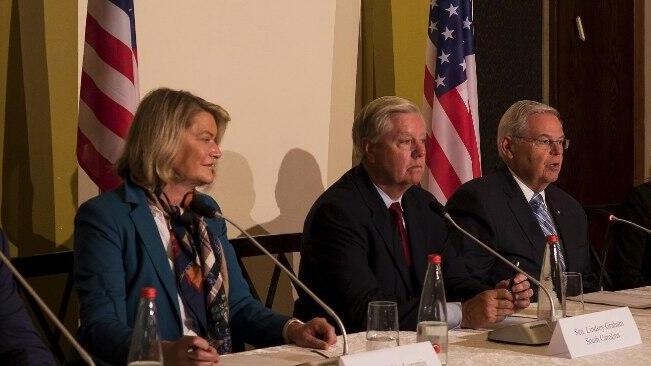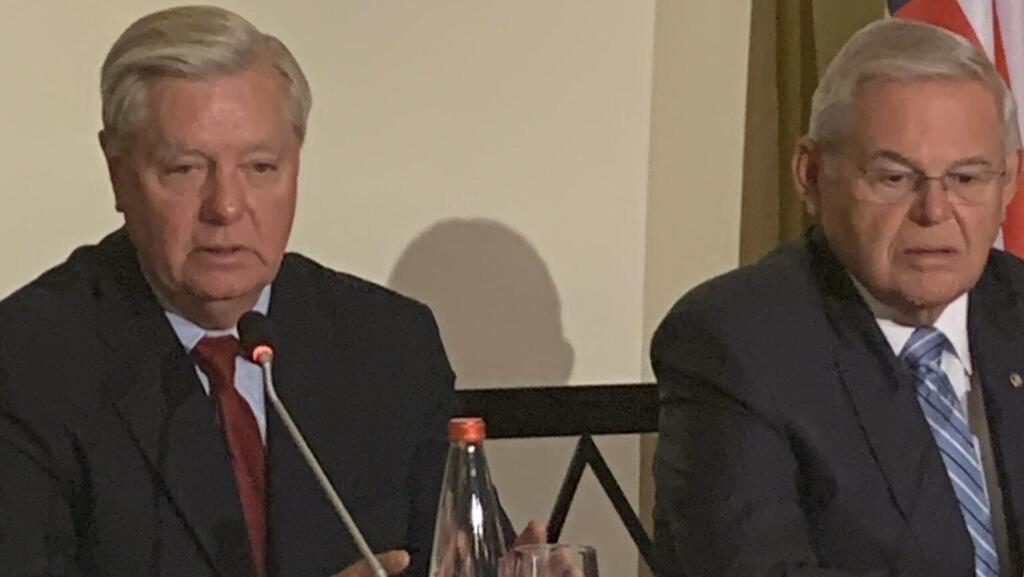Getting your Trinity Audio player ready...
A bipartisan delegation of American lawmakers has heard “pretty chilling information” during their current trip to Israel about the Iranian regime’s plans should it become a nuclear power, veteran U.S. Senator Lindsey Graham (R-SC) said in Jerusalem on Monday, as he broke off from meetings with Israeli officials to talk to reporters.
Graham, a staunch opponent of the arrangement to curb Iran’s nuclear activity in return for a lifting of sanctions, has been against the deal since its first incarnation in 2015, when world powers led by former U.S. President Barack Obama, a Democrat, reached an agreement that culminated in the signing of the officially titled Joint Comprehensive Plan of Action.
3 View gallery


(L-R) Rep. Ronny Jackson (R-Tex.), Sen. Cindy Hyde-Smith (R-Miss.), Sen. Lindsey Graham (R-SC), Sen. Bob Menendez (D-NJ) and Sen. Marsha Blackburn (R-Tenn.) speak to the press at the King David Hotel in Jerusalem, Sept. 5, 2022
(Photo: Dario Sanchez/The Media Line)
Sen. Graham was also a strong supporter of former President Donald Trump’s decision to pull the United States out of the agreement in 2018 and has criticized Trump’s successor, U.S. President Joe Biden, for attempting to revive the deal since he took office in January 2021.
Israel has also been a consistent opponent of the nuclear agreement. The deal ostensibly keeps Iran a year away from reaching the threshold for a nuclear weapon, although officials in Jerusalem have expressed concern this so-called breakout period would be far shorter.
The senator on Monday highlighted the fact that most Israelis are opposed to the agreement – opposition that has remained constant despite the changing in government in Jerusalem.
“The Israeli people seem to be united around the idea that the world should be wary of Iran,” the senator said.
Prime Minister Yair Lapid has dispatched senior defense officials to Washington in recent days to press the issue, among them Defense Minister Benny Gantz, national security adviser Eyal Hulata, and Mossad chief David Barnea. The latter set off for the U.S. capital on Monday.
Sen. Graham was joined at the press conference by Sen. Bob Menendez (D-NJ) – another long-standing critic of the nuclear deal – and fellow Republicans Sen. Marsha Blackburn of Tennessee, Rep. Ronny Jackson of Texas, and Sen. Cindy Hyde-Smith of Mississippi.
3 View gallery


(L-R) Sens. Lindsey Graham (R-SC) and Bob Menendez (D-NJ) at the press conference at the King David Hotel in Jerusalem, Sept. 5, 2022
(Photo: The Media Line)
The veteran lawmaker said that he and Menendez had formulated their own plan to curb Iranian atomic ambitions, which would allow Iran to have nuclear power but would insist that all uranium enrichment take place outside of the region.
The senator began the press conference with a firm statement that the United States and Israel will be allies regardless of which political party holds the reins of power in the respective countries.
Israel will hold parliamentary elections in November, while Americans will vote for members of the Houses of Representatives and the Senate, potentially giving control of both to the Republican Party.
“The purpose of the trip, from my point of view, was to stress continuity” of ties between the two nations, Graham told reporters at a press conference brought to an end by the lawmakers’ departure for a meeting with Prime Minister Yair Lapid.
3 View gallery


Prime Minister Benjamin Netanyahu hosts Republican South Carolina Senator Lindsey Graham at the Prime Minister’s Office in Jerusalem, May 31, 2021
(Photo: GPO)
Highlighting that both Israel and the U.S. hold decisive elections in November, the senator said that the Israeli government, regardless of who leads it, could be confident in U.S. support.
“There’s a lot of division at home and there’s a lot of contention here in Israel,” the senator said, “but the point of this trip is to collect information about the Iran program [and] to reassure the Israeli government – left, right, middle – that the U.S.-Israel relationship is foundational to both countries; that no matter what happens, in November in America … the assistance that Israel enjoys from the American government will continue.”
The story is written by Sara Miller and reprinted with permission from The Media Line

